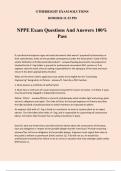©THEBRIGHT EXAM SOLUTIONS
10/30/2024 11:32 PM
NPPE Exam Questions And Answers 100%
Pass
If a professional engineer signs and seals documents that weren't prepared by themselves or
their subordinates, what are the possible consequences under the Association's Code of Ethis
and/or Definition of Professional Misconduct? - answer✔Sealing documents not prepared or
checked by the P. Eng holder is ground for professional misconduct (PM, section e). If an
engineer seals the work, they are taking responsibility for the adequacy of the work and must
ensure it has been appropriately checked.
What are the three criteria applicants must satisfy to be eligible for the "Consulting
Engineering" designation in Ontario - answer✔1. Must be a PEO member
2. Must possess a certificate of authorization
3. Must have a minimum of 5 years experience beyond the 4 years to license. 2 of these 5 years
must be primarily engaged in independent practice.
Define: "Ethics" - answer✔Ethics is a branch of philosophy which studies right and wrong, good
and evil, obligations and rights. The Code of Ethics for licensed engineers in Ontario describes
the high standard of professionalism to which members are expected to adhere.
An engineer (Ed) with a P. Eng is hired as a contractor to work in a power plant as an expert
advisor. The client (Ben) also holds a P. Eng, and is responsible for supervising all construction
labour. Ed notices that the plant has no safety procedures in place.
Does Ed, who was hired only to provide technical advise about the construction of the plant,
have any obligation in respect to the possible danger that the crew faces? Provide reasoning. -
answer✔Yes, Ed has an obligation to the possible danger. Engineers must regard their duty to
the public's welfare as paramount (Ethics section 21). If Ed did not act, he would face
professional misconduct for failure to act or correct a situation that may endanger public safety
(PM Section c).
, ©THEBRIGHT EXAM SOLUTIONS
10/30/2024 11:32 PM
Ed should make his concerns known to Ben, who is also a P. Eng. The client may be guilty of
Professional Misconduct (PM, section b). Ben hasn't provided reasonable provisions for the
safeguarding of life and health of those affected by the work. Safety measures are often under
a government regulation, so Ben likely also failed to make responsible provision for complying
with applicable regulations (PM, section d).
Professional Misconduct, Section a - answer✔Negligence
professional misconduct, section b - answer✔failure to make reasonable provision for the
safeguarding of life, health or property of a person who may be affected by the work for which
the practitioner is responsible
professional misconduct, section c - answer✔failure to act to correct or report a situation that
the practitioner believes may endanger the safety or the welfare of the public
Professional Misconduct, section d - answer✔failure to make responsible provision for
complying with applicable statutes, regulations, standards, codes, by-laws and rules in
connection with work being undertaken by or under the responsibility of the practitioner
Professional Misconduct, section e - answer✔signing or sealing a final drawing, specification,
plan, report or other document not actually prepared or checked by the practitioner
Professional Misconduct, section f - answer✔failure of a practitioner to present clearly to the
practitioner's employer the consequences to be expected from a deviation proposed in work, if
the professional engineering judgment of the practitioner is overruled by non-technical
authority in cases where the practitioner is responsible for the technical adequacy of
professional engineering work
Professional Misconduct, section g - answer✔breach of the Act or regulations, other than an
action that is solely a breach of the code of ethics
Professional Misconduct, section h - answer✔undertaking work the practitioner is not
competent to perform by virtue of the practitioner's training and experience
Professional Misconduct, section i - answer✔failure to make prompt, voluntary and complete
disclosure of an interest, direct or indirect, that might in any way be, or be construed as,
prejudicial to the professional judgment of the practitioner in rendering service to the public, to
an employer or to a client, and in particular, without limiting the generality of the foregoing,
carrying out any of the following acts without making such a prior disclosure:
, ©THEBRIGHT EXAM SOLUTIONS
10/30/2024 11:32 PM
1. Accepting compensation in any form for a particular service from more than one party.
2. Submitting a tender or acting as a contractor in respect of work upon which the practitioner
may be performing as a professional engineer.
3. Participating in the supply of material or equipment to be used by the employer or client of
the practitioner.
4. Contracting in the practitioner's own right to perform professional engineering services for
other than the practitioner's employer.
5. Expressing opinions or making statements concerning matters within the practice of
professional engineering of public interest where the opinions or statements are inspired or
paid for by other interests
Professional Misconduct, section j - answer✔conduct or an act relevant to the practice of
professional engineering that, having regard to all the circumstances, would reasonably be
regarded by the engineering profession as disgraceful, dishonourable or unprofessional
Professional Misconduct, section k - answer✔failure by a practitioner to abide by the terms,
conditions or limitations of the practitioner's licence, provisional licence, limited licence,
temporary licence or certificate
Professional Misconduct, section l - answer✔failure to supply documents or information
requested by an investigator acting under section 33 of the Act
Professional Misconduct, section m - answer✔permitting, counselling or assisting a person who
is not a practitioner to engage in the practice of professional engineering except as provided for
in the Act or the regulations
Professional Misconduct, section n - answer✔harassment. R.R.O. 1990, Reg. 941, s. 72 (2); O.
Reg. 657/00, s. 1 (2); O. Reg. 13/03, s. 19




